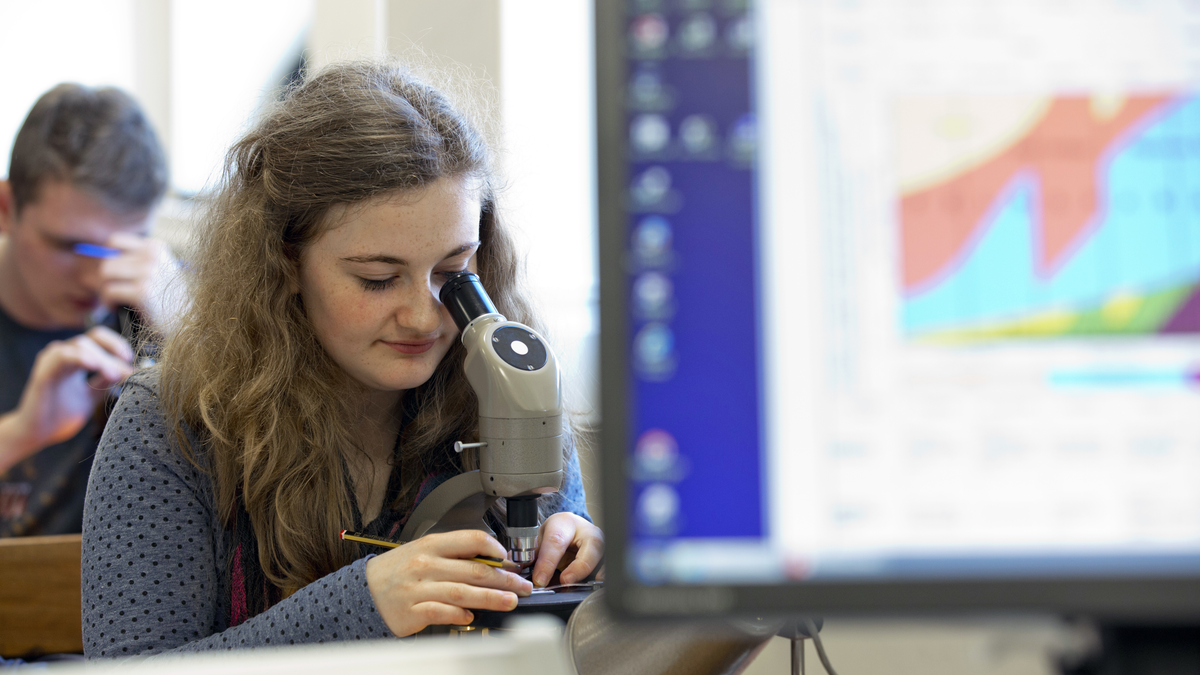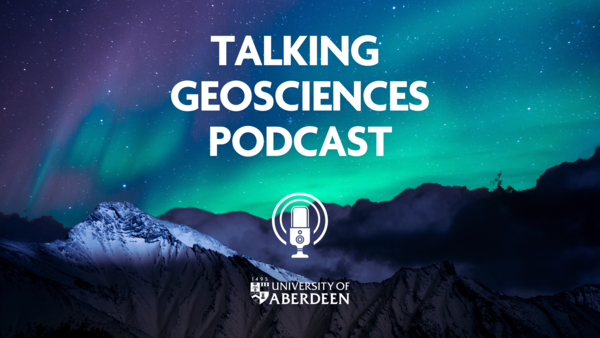Introduction
Geology offers you the chance to find out how the Earth works and when you combine Physics with this subject you get a real sense of energy and matter and their interaction.
Study Information
At a Glance
- Learning Mode
- On Campus Learning
- Degree Qualification
- BSc
- Duration
- 48 months
- Study Mode
- Full Time
- Start Month
- September
- UCAS Code
- FF63
- Pathway Programme Available
- Undergraduate Foundation Programme

Joint degree programme combining approximately 50% Geology and 50% Physics courses of study.
What You'll Study
- Year 1
-
Compulsory Courses
- Getting Started at the University of Aberdeen (PD1002)
-
This course, which is prescribed for level 1 undergraduate students (and articulating students who are in their first year at the University), is studied entirely online, takes approximately 5-6 hours to complete and can be taken in one sitting, or spread across a number of weeks.
Topics include orientation overview, equality and diversity, health, safety and cyber security and how to make the most of your time at university in relation to careers and employability.
Successful completion of this course will be recorded on your Enhanced Transcript as ‘Achieved’.
- The Nature of The Environment Through Geological Time (GL1005)
-
15 Credit Points
For 4,500 million years the Earth has been, and still is, a continually evolving Dynamic Planet. The record is held in the rocks and fossils of the present continental landmasses and ocean basins. To deduce the history of the planet geologists must apply a large range of scientific principles and disciplines. These disciplines encompass the biological, chemical and physical sciences. The course provides a basic understanding of how the structure and evolution of the planet are deduced and how this information can be used to discover and extract natural resources such as fossil fuels and ores.
- The Physical Universe A (PX1015)
-
15 Credit Points
Physics is the most fundamental of the sciences, and if we wish to better understand the nature and behaviour of the Universe, it is perhaps the best place to start. This course introduces the basic topics of Physics, from the sub-microscopic scale of electrons and atoms, to the orbits of the planets and stars, to the celestial mechanics of galaxies. It encompasses the work of Physicists like Isaac Newton, Albert Einstein, Marie Curie and Jocelyn Bell Burnell. If you’ve ever been curious about how the world works, you will hopefully find this course, typically well-regarded by students, interesting.
- Calculus 1 (MA1005)
-
15 Credit Points
Calculus is the mathematical study of change, and is used in many areas of mathematics, science, and the commercial world. This course covers differentiation, limits, finding maximum and minimum values, and continuity. There may well be some overlap with school mathematics, but the course is brisk and will go a long way quickly.
- Algebra (MA1006)
-
15 Credit Points
This course introduces the concepts of complex numbers, matrices and other basic notions of linear algebra over the real and complex numbers. This provides the necessary mathematical background for further study in mathematics, physics, computing science, chemistry and engineering.
- Earth's Materials (GL1505)
-
15 Credit Points
Following on from GL1005 this course is an introduction to the petrogenesis of three major rock groups; igneous, metamorphic and sedimentary. Practical classes will centre around the use of polarizing microscope in the identification of the common rock-forming minerals. The relationship between plate tectonics and the petrogenesis of igneous, sedimentary and metamorphic rocks, including types and styles of volcanic eruptions will be addressed.
- The Physical Universe B (PX1513)
-
15 Credit Points
Understanding electric and magnetic forces is of paramount importance for understanding the physical world. They are eventually responsible for the matter around us to self-organize (in solid, liquid and gas phases), with given structures, density, elastic properties, and so on. Furthermore, they are responsible for light emission and propagation across the space.
Already the first rudiments of electricity and magnetism will help to appreciate that they are two difference faces of the same coin: electromagnetism. This relationship is the first evidence of the possibility to build a unified description of the microscopic laws of the physical universe.
- Calculus II (MA1508)
-
15 Credit Points
The aim of the course is to provide an introduction to Integral Calculus and the theory of sequences and series, to discuss their applications to the theory of functions, and to give an introduction to the theory of functions of several variables.
This provides the necessary mathematical background for further study in mathematics, physics, computing science, chemistry and engineering.
Optional Courses
Select a further 15 credit points from courses of choice.
- Year 2
-
Compulsory Courses
- Petrology & Mineralogy (GL2015)
-
15 Credit Points
Petrology and mineralogy is a compulsory course for geology students. It covers igneous, metamorphic and sedimentary petrology. The course has a strong practical component and involves the preparation of workbooks based on individual study and practical exercises that use hand specimens, microscope work and chemical data.
- Light Science (PX2013)
-
15 Credit Points
For most of us, our perceptions are governed most strongly by our vision. We see because of light, but what is light? It’s been considered a particle, a wave, and in modern physics is somehow both. This course explores the fascinating physics of this phenomenon, at an elementary mathematical level suitable for non-science students. We’ll cover petrological microscopy, of interest to geologists, interference and diffraction, how colour works, see how polarisation can be applied in both scientific fields and every day life, and see how the photon can be used in devices in the increasing prevalent field known as photonics.
- Dynamical Phenomena (PX2015)
-
15 Credit Points
Understanding oscillatory and wavelike behaviour is of huge importance in comprehending how our natural world works. It seems that everything in nature has its own cycle, rhythm or oscillation. From planets revolving around the sun to waves on the sea, even fundamental particles are treated as waves in modern physics. Accessible to students with some knowledge of calculus, this course will explain the mathematics of this fascinating and important subject. Methods of solving the differential equations that describe waves and oscillatory phenomena will be explored, including numerical techniques.
- An Introduction to Field Geology (GL2510)
-
15 Credit Points
Field-based observation is an essential skill for understanding the origin of rocks, and is a vital reality-check for understanding how Geological Science is practised and developed. This course gives students experience with techniques for investigating rocks in their natural habitat, studying the crucial relationships between different units, and developing good habits for observing and recording data in the field. Students learn how to perceive geology in 3D, and to develop working hypotheses from incomplete evidence. This is achieved through a five-day residential field trip (takes place in the Easter break) which is preceded by wide-ranging practical classes and explanatory lectures.
- Geophysics (GL2511)
-
15 Credit Points
This course introduces you to some of the physics that underlies Earth’s processes, and shows you how geophysical methods can be used to uncover Earth’s structure and processes. From how the Earth moves around the solar system, to how rocks bend and break, from earthquake hazards to uncovering mineral resources, this course will allow you to gain skills and knowledge that will be important for the rest of your degree and future careers.
- Practical Optics and Electronics (PX2505)
-
15 Credit Points
This 100% continuously assessed course explores two fundamental areas of physics. In electronics you will go from building simple circuits to designing complex logical architectures, using both real components and simulation software.
The optics half of the course explores various fascinating optical phenomena, some of which are practically applicable for geologists and many other scientific disciplines. The practicals elegantly demonstrate the fundamental properties of light.
- Relativity and Quantum Mechanics (PX2510)
-
15 Credit Points
In the 20th Century, Physics got strange, and this course sets out to explore the foundations of this modern approach. In Special Relativity we will look at the idea that time is not an absolute – that events can happen in different times for different observers – and explore the effects of travelling at close to the speed of light. The quantum mechanics section introduces some of the most exciting and dramatically successful science of all time, and discuss the evolution of this idea from the days of Schrodinger’s cat to quantum tunnelling.
Optional Courses
Select one of the following:
- Earth’s Life: Environments and Climate Through Time (GL2017)
- 15 credit point level MA2 course.
- Earth’s Life, Environments and Climate Through Time (GL2017)
-
15 Credit Points
This course explores how Earth’s life, environments and climate have changed through the history of the planet, from its origins until the Recent past. This exciting story, including for example Earth-covering “snowball” glaciations, mass extinctions, and the origins of life on land, is unravelled by looking at fossils, sedimentary rocks and their chemical signals, learning and applying the fundamental methods and principles required to determine sequences of events in Earth's history (stratigraphy).
- Year 3
-
Compulsory Courses
- Field and Mapping Techniques 1 (GL3026)
-
15 Credit Points
This course is based on a residential field programme that enables students to directly study geological phenomena and relationships in the field. it provides hands-on experience and develops 3-D approaches to thinking and problem solving. The learning environment is remote from the university, and encourages students to learn individually and in small group settings. The course covers a range of techniques typically, geological field mapping, sedimentary logging, and examination of detailed field relationships to enable broader scale conclusions to be drawn. Assessments are undertaken during the actual field course. The field course is paid for directly by participants.
- Energy and Matter (PX3014)
-
15 Credit Points
Our world is made of three types of matter, Solids, Liquids and Gases. The first part of this course will explore the physical properties of these forms of matter and investigate important technological phenomena such as the flow of liquids and the causes of catastrophic failure in mechanical components. In the second half of the course, the nature of heat energy in matter will be explored. Thermodynamic behaviour will be understood in terms of Entropy and the operation of engines and their theoretical efficiency limitations will be explained.
- Quantum Mechanics (PX3511)
-
15 Credit Points
The course aims to provide the students with the underpinning knowledge that will enable them to think constructively about phenomena that relate to the quantum structure of matter. It is intended that the students will gain a broad appreciation of the hierarchy of interactions that give rise to the energy levels of atoms and the consequent structure of the associated spectroscopic transitions. In comparison to the previous years more emphasis will be put on the general, mathematical structure of quantum theory, tackling topics such as Hilbert spaces and time independent perturbation theory.
- Electricity and Magnetism (PX3512)
-
15 Credit Points
We are surrounded by electromagnetic phenomena; it is not possible to understand the physical world without them. In this course we will discuss the link between electricity and magnetism, noticing that changing electric magnetic fields generate electric fields and the other way around. This will lead to the introduction of Faraday’s law, hugely relevant to understand how we generate electricity, and to the introduction of Maxwell’s correction to Ampere’s law, which will lead to the astounding result that light is an electromagnetic wave! We will finish the course by exploring how electromagnetic waves propagate and how they are originated.
Optional Courses
Select:
- Principles of Petroleum Geology (GL3018) OR Structural Geology & Tectonics (GL3027)
- Igneous & Metamorphic Petrology (GL3520) OR Sedimentology (GL3521)
- Introduction to the Solid State (PX3016) OR Mathematical Methods in Physics (PX3020).
Plus select further 15 credit points from courses of choice.
- Principles of Petroleum Geology (GL3018)
-
15 Credit Points
This course introduces students to the key issues surrounding being a geologist in the petroleum industry. With the changing nature of hydrocarbon exploration and production, both conventional and unconventional hydrocarbons are considered. The key concepts of the origin and generation of hydrocarbons, reservoir rocks and subsurface reservoir structures (traps) are introduced, together with some of the key techniques used within the industry (e.g. reservoir geology, petrophysics and formation evaluation). Practical issues such as how hydrocarbon wells are drilled and how rocks are sampled in the subsurface are also considered.
- Structural Geology & Tectonics (GL3027)
-
15 Credit Points
This course covers all main aspects of structural geology and tectonics and entails 1 hour lectures and 3 hour practicals each week, together with a field excursion to relatively local geology. The significant practical component allows 'hands on' learning with worked examples being provided by staff. The field excursion allows students to directly apply skills and techniques that have been covered in preceding lectures and practicals. with worked examples then provided in follow-up sessions. The course covers a spectrum of brittle and ductile structures that are developed across a range of scales from microscopic to mountain belt.
- Igneous & Metamorphic Petrology (GL3520)
-
15 Credit Points
This course is in 2 parts. In part 1, the students explore the links between tectonic setting and magma genesis, with particular reference to geochemical signatures recorded in the rocks. In part 2, students look at how different bulk protolith compositions control the metamorphic mineral paragenesis, with an emphasis on observing and recording evidence from textures in thin sections. In a world of post-peak oil, exploration for new reserves is now moving to igneous and metamorphic rocks, and a thorough understanding of these rocks is essential for the practising geologist.
- Sedimentology (GL3521)
-
15 Credit Points
Sedimentology is fundamental to interpreting past climate and geography from the evidence in the rock record of the environment in which sediment was deposited. This course develops the skills needed to make such interpretations by cultivating proficiency at description and process-based interpretation of sedimentary successions, and showing how study of modern environments is used to decipher sedimentary processes. We review the controls on the preservation of sediments to make the rock record, including an introduction to the concepts of genetic (sequence) stratigraphy, and see how this can improve discovery and recovery of water and hydrocarbon resources in the subsurface.
- Introduction to the Solid State (PX3016)
-
15 Credit Points
The course is based on modern views on the structure of solids, how that structure is determined by X-ray crystallography and the basics of structure-property relationships. This involves learning the language of the basic shapes and symmetry displayed by crystals, then using that within the interdisciplinary subject of X-ray crystallography, source of many Nobel prizes and great advance in Physics, Chemistry, Materials Science, Biology and Medicine. The course then briefly examines some key topics including semiconductors, defects and amorphous materials.
- Mathematical Methods in Physics (PX3020)
-
15 Credit Points
This course introduces key mathematical methods required in more advanced physics courses. The mathematical methods introduced in this course will be key to understand courses such as Electricity and Magnetism, Quantum Mechanics and Statistical Physics. The importance of the mathematical and computational methods discussed in this course goes beyond being useful for other physics courses, as they will provide you with key analytical tools to approach a large variety of problems, also relevant for your career after University.
- Year 4
-
Compulsory Courses
- Project A (PX4011)
-
30 Credit Points
PX4011 provides the opportunity to carry out an independent, open-ended, piece of research work. This can be in an area of physics (astronomy, nuclear physics, superconductors, dynamical systems etc.) or in related subjects where physicists tools can be applied (generation of proteins, biomechanics, infectious diseases etc.). The project can be dissertation based, practical or computational. You will develop: presentation skills; experience of reading and thinking about a specialist topic in depth; critical analysis skills of your own and other people’s scientific work and project management skills. This will help prepare for your future career beyond university.
- Geochemistry and Geofluids (GL4031)
-
15 Credit Points
This course trains students in advanced basin analysis and geofluid and geochemistry techniques, that can be used to model and understand the subsurface over deep geological time. Techniques focus on the manipulation and interpretation of geochemical data. Field excursions, including a residential trip, are central to the course as are projects involving group work and individual study. The course includes advanced academic topics at the frontiers of current research, but is also excellent preparation for working in the petroleum and subsurface sectors.
Optional Courses
Select one of the following:
- Case Studies in the Physics (PX4007) OR Statistical Physics and Stochastic Systems (PX4012)
- Structure of Matter and the Universe (PX4510)* OR Nuclear and Semiconductor Physics (PX4516)* OR Modelling Theory (PX4514)
*These courses alternate on a two-year cycle. PX4516 will run in 2022-2023.
Plus 30 credit points from level 4 Geology courses.Select a further 30 credit points from level 4 courses in Geology.
- Case Studies in Physical Sciences (PX4007)
-
15 Credit Points
Whatever career you end up in, group working skills will be critical, and this course is designed to develop them. It is 100% continuously assessed and consists of some initial teamwork training, followed by two very different projects. One explores PET scanning and is taught by Professor Andy Welch, who is in charge of the medical imaging unit at Foresterhill. The other is about fibre optics communications and is taught by Dr. Ross Macpherson. These open-ended projects will give you some less prescriptive assessment in your final year.
- Statistical Physics and Stochastic Systems (PX4012)
-
15 Credit Points
Statistical physics derives the phenomenological laws of thermodynamics from the probabilistic treatment of the underlying microscopic system. Statistical physics, together with quantum mechanics and the theory of relativity, is a cornerstone in our modern understanding of the physical world.
Through this course, you will gain a better understanding of fundamental physical concepts such as entropy and thermodynamic irreversibility, and you will learn how derive some simple thermodynamic properties of gases and solids.
The final part of the course is devoted to an introduction to stochastic systems, which are widely used in many different fields such as physics, biology and economics.
- Modelling Theory (PX4514)
-
15 Credit Points
This course was designed to show you what you can do with everything you learnt in your degree. We will use mathematical techniques to describe a fast variety of “real-world” systems: spreading of infectious diseases, onset of war, opinion formation, social systems, reliability of a space craft, patterns on the fur of animals (morphogenesis), formation of galaxies, traffic jams and others. This course will boost your employability and it will be exciting to see how everything you learnt comes together.
We will endeavour to make all course options available. However, these may be subject to change - see our Student Terms and Conditions page.
How You'll Study
Learning Methods
- Field Trips
- Group Projects
- Individual Projects
- Lab Work
- Lectures
- Tutorials
Assessment Methods
Students are assessed by any combination of three assessment methods:
- coursework such as essays and reports completed throughout the course;
- practical assessments of the skills and competencies learnt on the course; and
- written examinations at the end of each course.
The exact mix of these methods differs between subject areas, year of study and individual courses.
Honours projects are typically assessed on the basis of a written dissertation.
Why Study Geology and Physics?
- Aberdeen is the oil and gas capital of Europe making it the most relevant place in the UK to study Geology and Petroleum Geology.
- Understanding Geology is fundamental to the exploration for hydrocarbon resources and this is why we offer a Petroleum Geology degree at Aberdeen. However, we also ensure you have a basic knowledge of the way the Earth works as this is vital to the understanding of the nature and origin of Earth Resources.
- Fieldwork is an important element of our Geology degree, we make the best use of our location in Scotland – close to many great areas for fieldwork.
- Fieldwork locations include - Arran, Skye, NW Highlands and other areas throughout the UK. The MGeol programme includes a trip to Italy.
- Aberdeen is geographically perfect for the study of Geology, having some world-class field sites close at hand which can be conveniently visited on day courses. Many of the UK's top 100 Geological sites are within easy reach from Aberdeen and are visited by our students and staff alike.
- Many past graduates continue to work in the city and links with industry are therefore very strong with employability being second to none.
- You will have the chance to join the American Association of Petroleum Geologists Student Chapter. This is an active and very social Student Chapter which will give you the opportunity to expand your knowledge, skills and networks beyond the classroom.
- To expand skills, knowledge and networks even further, many of our students join the Aberdeen Geology Society.
- Our BSc degrees are fully accredited by the Geological Society for London.
Entry Requirements
Qualifications
The information below is provided as a guide only and does not guarantee entry to the University of Aberdeen.
General Entry Requirements
- 2024 Entry
-
SQA Highers
Standard: AABB*
Applicants who have achieved AABB (or better), are encouraged to apply and will be considered. Good performance in additional Highers/ Advanced Highers may be required.
Minimum: BBB*
Applicants who have achieved BBB (or are on course to achieve this by the end of S5) are encouraged to apply and will be considered. Good performance in additional Highers/Advanced Highers will normally be required.
Adjusted: BB*
Applicants who have achieved BB, and who meet one of the widening access criteria are are guaranteed a conditional offer. Good performance in additional Highers/Advanced Highers will be required.
* Including good performance in Mathematics and Physics by the end of your senior phase of education.
More information on our definition of Standard, Minimum and Adjusted entry qualifications.
A LEVELS
Standard: BBB*
Minimum: BBC*
Adjusted: CCC*
* Including good performance in Mathematics and Physics by the end of your senior phase of education.
More information on our definition of Standard, Minimum and Adjusted entry qualifications.
International Baccalaureate
32 points, including 5, 5, 5 at HL, including HL in Mathematics and Physics.
Irish Leaving Certificate
5H with 3 at H2 AND 2 at H3, Including H3 in Mathematics and Physics.
- 2025 Entry
-
SQA Highers
Standard: BBBB*
Applicants who have achieved BBBB (or better), are encouraged to apply and will be considered. Good performance in additional Highers/ Advanced Highers may be required.
Minimum: BBC
Applicants who have achieved BBC at Higher and meet one of the widening participation criteria above are encouraged to apply and are guaranteed an unconditional offer for MA, BSc and BEng degrees.
Adjusted: BB
Applicants who have achieved BB at Higher, and who meet one of the widening participation criteria above are encouraged to apply and are guaranteed an adjusted conditional offer for MA, BSc and BEng degrees.
We would expect to issue a conditional offer asking for one additional C grade at Higher.
Foundation Apprenticeship: One FA is equivalent to a Higher at A. It cannot replace any required subjects.
* Including good performance in Mathematics and Physics by the end of your senior phase of education.
More information on our definition of Standard, Minimum and Adjusted entry qualifications.
A LEVELS
Standard: BBC*
Minimum: BCC*
Adjusted: CCC*
* Including good performance in Mathematics and Physics by the end of your senior phase of education.
More information on our definition of Standard, Minimum and Adjusted entry qualifications.
International Baccalaureate
32 points, including 5, 5, 5 at HL, including HL in Mathematics and Physics.
Irish Leaving Certificate
5H with 3 at H2 AND 2 at H3, Including H3 in Mathematics and Physics.
The information displayed in this section shows a shortened summary of our entry requirements. For more information, or for full entry requirements for Sciences degrees, see our detailed entry requirements section.
English Language Requirements
To study for an Undergraduate degree at the University of Aberdeen it is essential that you can speak, understand, read, and write English fluently. The minimum requirements for this degree are as follows:
IELTS Academic:
OVERALL - 6.0 with: Listening - 5.5; Reading - 5.5; Speaking - 5.5; Writing - 6.0
TOEFL iBT:
OVERALL - 78 with: Listening - 17; Reading - 18; Speaking - 20; Writing - 21
PTE Academic:
OVERALL - 59 with: Listening - 59; Reading - 59; Speaking - 59; Writing - 59
Cambridge English B2 First, C1 Advanced or C2 Proficiency:
OVERALL - 169 with: Listening - 162; Reading - 162; Speaking - 162; Writing - 169
Read more about specific English Language requirements here.
International Applicants who do not meet the Entry Requirements
The University of Aberdeen International Study Centre offers preparation programmes for international students who do not meet the direct entry requirements for undergraduate study. Discover your foundation pathway here.
Fees and Funding
You will be classified as one of the fee categories below.
| Fee category | Cost |
|---|---|
| RUK | £9,250 |
| Tuition Fees for 2025/26 Academic Year | |
| EU / International students | £24,800 |
| Tuition Fees for 2025/26 Academic Year | |
| Home Students | £1,820 |
| Tuition Fees for 2025/26 Academic Year |
Scholarships and Funding
Students from England, Wales and Northern Ireland, who pay tuition fees may be eligible for specific scholarships allowing them to receive additional funding. These are designed to provide assistance to help students support themselves during their time at Aberdeen.
Additional Fees
- In exceptional circumstances there may be additional fees associated with specialist courses, for example field trips. Any additional fees for a course can be found in our Catalogue of Courses.
- For more information about tuition fees for this programme, including payment plans and our refund policy, please visit our Tuition Fees page.
Our Funding Database
View all funding options in our Funding Database.
Careers
Each year, over 91% of our Geology graduates are in employment or further study 6 months after graduating.
Our degree(s) in Geology open up career opportunities with the global oil and gas industry, as well as other key sectors. Our degrees are highly respected by the oil and gas industry and our graduates are in high demand.
Geology is also a subject that opens up tremendous opportunities for further study, either at MSc or PhD level.
The Prospects 'Options' Series allows you to discover how best to use your degree. The 'Options' series gives an idea of the skills gained throughout your degree, job options, career areas, further study, case studies, contacts and resources. Those studying for a combined degree might find it useful to look at an 'Option' sheet for each subject.
Career Opportunities
- Associate Technical Professional
- Borehole Geologist
- Data Manager
- Field Engineer
- Logging Geologist
- Mudlogger
- Site Engineering Geologist
- Well Planning Engineer
Accreditation
This degree holds accreditation from
Our Experts
You will be taught by research active academic staff, each with vast knowledge and experience of working in and/or with industry. Some of our staff are truly leading and renowned Geology academics. Each one is passionate about the subject and fully supportive.
- Programme Coordinator
- Dr David Muirhead
- Programme Manager
- Professor Robert Butler
More on Our Experts
-

Person Placeholder Dr David Muirhead
-

Person Placeholder Professor Robert Butler
Information About Staff Changes
You will be taught by a range of experts including professors, lecturers, teaching fellows and postgraduate tutors. However, these may be subject to change - see our Student Terms and Conditions page.
Features

Geophysics Field Trips
Field-trips play a major part in the learning process. Students get the chance to test out their new-found skills whilst using state-of-the-art equipment.

Aberdeen University Geological Society
Student-led social and professional events and networking.
Find out more
Learn from world-class experts
Example - Congratulations to Professor Norval Strachan, Head of Physics at the University of Aberdeen, who has been appointed as Food Standards Scotland's first Chief Scientific Adviser.
Find out moreDiscover Uni
Discover Uni draws together comparable information in areas students have identified as important in making decisions about what and where to study. You can compare these and other data for different degree programmes in which you are interested.
Get in Touch
Contact Details
- Address
-
Student Recruitment & Admissions
University of Aberdeen
University Office
Regent Walk
Aberdeen
AB24 3FX


